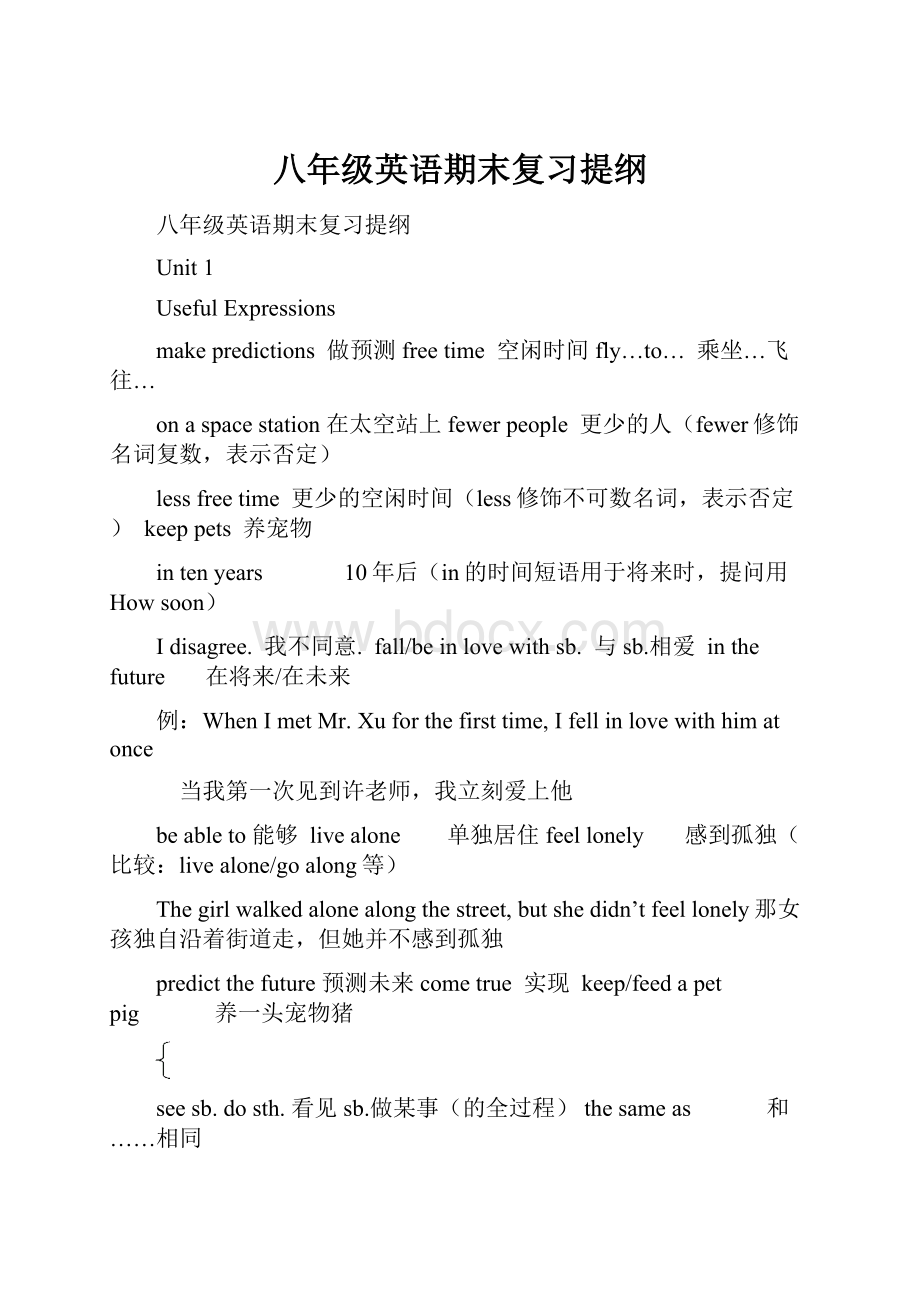八年级英语期末复习提纲.docx
《八年级英语期末复习提纲.docx》由会员分享,可在线阅读,更多相关《八年级英语期末复习提纲.docx(36页珍藏版)》请在冰豆网上搜索。

八年级英语期末复习提纲
八年级英语期末复习提纲
Unit1
UsefulExpressions
makepredictions做预测freetime空闲时间fly…to…乘坐…飞往…
onaspacestation在太空站上fewerpeople更少的人(fewer修饰名词复数,表示否定)
lessfreetime更少的空闲时间(less修饰不可数名词,表示否定)keeppets养宠物
intenyears 10年后(in的时间短语用于将来时,提问用Howsoon)
Idisagree.我不同意.fall/beinlovewithsb.与sb.相爱inthefuture 在将来/在未来
例:
WhenImetMr.Xuforthefirsttime,Ifellinlovewithhimatonce
当我第一次见到许老师,我立刻爱上他
beableto能够livealone 单独居住feellonely 感到孤独(比较:
livealone/goalong等)
Thegirlwalkedalonealongthestreet,butshedidn’tfeellonely那女孩独自沿着街道走,但她并不感到孤独
predictthefuture预测未来cometrue实现keep/feedapetpig 养一头宠物猪
seesb.dosth.看见sb.做某事(的全过程)thesameas 和……相同
doingsth.看见sb.正在做某事(片断)flytothemoon 飞上月球
hundredsof+复数 数百/几百(概数,类似还有thousandsof;millionsof)
A bedifferentfromB A与B不同(=Thereisadifference/TherearedifferencesbetweenAandB)
wakeup 醒来(wakesb.up表示“唤醒某人” lotsof/alotof 许多(修饰可数名词、不可数名词都可以)
getbored 变得厌倦(get/become是连系动词,后跟形容词如tired/angry/excited等)
goskating 去滑冰(类似还有gohiking/fishing/skating/bikeriding等)
helpsb.withsth.帮助某人做某事hundredsof数以百计的trytodosth.尽力做某事
looklike看上去长的像…lookfor寻找一段时间+fromnow(从现在起)…之后fromnowon=inthefutur今后studyoncomputers 通过电脑学习attheweekends 在周末
Idon’tagree.=Idisagree.我不同意helpsbwithsth/helpsbdosth 帮助某人做某事
onapieceofpaper在一张纸上onvacation 度假agreewithsb. 同意某人(的意见)
注意paper/information/news/work/homework/housework等常考到的不可数名词)
Areyoukidding?
你在骗我吗 manydifferentkindsofgoldfish 许多不同种金鱼
liveinanapartment 住在公寓里/liveonthetwelfthfloor 住在12楼 looksmart 显得精神/看起来聪明
liveatNO.332,ShanghaiStreet 住在上海路332号asareporter 作为一名记者
nomore=not…anymore 不再(强调多次发生的动作不再发生)
nolonger=not…anylonger 不再(强调状态不再发生)
besides(除…之外还,包括)与except=but(除…之外,不包括)
beableto与can 能、会
(beableto用于各种时态,而can只能用于一般现在时态和一般过去时态中;haveto用于各种时态,而must只能用于一般现在时态)
例如:
1.Ihavebeenableto/willbeabletospeaktwolanguages.(不可以用can)
2.willhaveto/hadtostayathome.(不可以用must)
KeyPoints
1.Doyouthink…?
Ithink(that)….Idon’tthink(that)….
2.studyathomeoncomputer
辨析:
on,in和with.
on:
表示使用通讯工具、信息或传媒,乘坐交通工具等;
in:
使用语言文字等媒介;
with:
借助具体的手段或工具。
Eg.Idon’twanttotalkaboutitonthephone.
CanyouspeakitinEnglish?
Don’twriteitwitharedpen.
3.“in+时间”结构常与一般将来时连用,对其进行提问时用特殊疑问词howsoon.
Willpeopleusemoneyin100years?
4.before
ago与过去时连用
GrammarFocus
TheSimpleFuturetense
一般将来时的三种基本结构:
⑴will+V.
⑵begoingto+V.
⑶be+Ving
一般将来时的时间状语:
in+时间,inthefuture,next+时间,
与tomorrow相关的时间,this+时间,fromnowon,rightnow,someday…
2.形容词、副词的比较级用法
Unit2
1.arguewithsb.与某人争吵
about/oversth.为某事争吵
outofstyle/danger过时/脱离险境instyle/danger时尚/处于危险之中
callupsb.(代词放中间)给某人打电话keepout不让…进入What’swrong?
怎么啦?
besurprisedat…对…感到吃惊borrowsth.fromsb.从某人那里借入某物
needtodosth.(某人)需要做某事
doingsth.(某物)需要做某事
pay…forsth.为某物付…(钱)thesame+n.+as…与…一样的n.
getonwellwithsb.与某人相处融洽haveafightwithsb.与某人争吵takepartin加入plansth.forsb.为某人计划某事asmuchaspossible尽可能多的…
Sb.pay…forsth.某人为某物花了…钱。
Sth.costsb.…某物花了某人…钱。
Sb.spend…onsth.某人花了…(时间、金钱)在某事上。
(in)doingsth.某人花了…(时间、金钱)做某事。
Ittakes/tooksb.…todosth.花了某人…(时间、金钱)做某事。
aticketto/foraballgame 一张球赛的门票
注意:
thekeytothelock/thekey(answer)tothequestion/thesolutiontotheproblem.此处几个短语不能用of表示所有格
enoughmoney 足够的钱(enough修饰名词时不必后置)borrow…from 从….借(借进来)
busyenough 够忙(enough修饰形容词或副词时必须后置) lend…to 把…借给(借出去)
failthetest=notpassthetest 考试不及格succeedin(doing)sth在...方面成功
failin(doing)sth…在...上失败,变弱surprisesb.使某人吃惊(类似有:
surprise/interest/please/amaze+某人)
abit=alittle一点儿(当修饰形容词或比较级时)returnsth.tosb.=givesth.backtosb把某物归还给某人
abitof=alittle 一点儿/一些(当修饰不可数名词时)preparefor…=getreadyfor… 为…做准备
dropoff 离去;散去;逐渐减少;死去fill…up 填补;装满…asmuchaspossible尽可能多
byoneself+onone’sown某人自己/独自地Ifind/feel/thinkitdifficulttodo... 我发现/感到/认为做某事很难
see/hear/watchsb.doingsth. 看到/听见/注视某人正在做…
toone’ssurprise使某人吃惊的是…..lookforapart-timejob找一份兼职的工作(不一定有结果)
toone’sjoy使某人高兴的是…..get/findapart-timejob找到一份兼职的工作(有结果)
2.not…until直到…才…(主句动词是短暂性动词)
until一直到…(主句中使用延续性动词)
3.leave
情态动词
情态动词没有人称和数的变化;
情态动词不能直接做谓语,必须和一个动词原形同时使用;
大多数情态动词没有时态的变化;
情态动词加上be,通常表示猜测的语气。
4.表示某人情绪有关的形容词用法:
be/become+ upset/tired/excited/interested/worried/surprised/amazed/annoyed
说明:
当主语是某人时,注意后面的形容词一般是-ed结尾的单词,而当主语是某物时或修饰名词时,注意后面形容词一般是-ing结尾单词.)
例如:
Iwassurprised/interested/amazedwhenIheardthesurprising/interesting/amazingnews.
Unit3
UE
infrontof----behide在…的前面----在…的后面
inthefrontof----atthebackof在…的前部----在…的后部(包含在内)
takeoff起飞getoutof离开…Youarekidding.胡说八道followsb.todosth.跟着某人做某事
getinto进入shoutat训斥、责备
shoutto向…喊叫
Whathappen?
发生什么事了?
happen=takeplace发生insilence沉默地
inspace在太空中atthedoctor’s在诊所jumpdownfrom…从…跳下climbupthetree爬上树
onSundayevening在星期日晚上
注意:
(特指某日如星期、假日、某月某日或某个特定的上、下午、晚上用on)
as+adj原形as 和…一样…
例如:
Sheis(not)asbeautifulashersister. Icanrunasfastashe(him)
takeplace 发生(强调必然性)
happentosth./sb. 发生(强调偶然性)
例如:
Whathashappenedtoyou?
=What’sthematterwithyou?
=What’swrongwithyou?
beillinhospital/bed 生病住院/在床insilence 沉默不语
KP
“as+形容词/副词的原级+as”表示“和…一样”
否定形式:
“notas/so+形容词/副词的原级+as”表示“和…不一样”
GF
ThePastProgressiveTense
过去进行时
⑴用法:
表示在过去某一时刻或某段时间内正在进行的动作。
⑵谓语结构:
be(was,were)+Ving
⑶时间状语:
atthattime/moment
at+点钟+yesterday/lastnight
from+点钟+to+点钟+yesterday
thistimeyesterday
justthen
whenhecamein,….(when引导的时间状语从句是过去时,并且动词是短暂性动词时,主句
使用过去进行时)
when&while
when与while都是从属连词,都有“当……时”的意思。
when可与一个点的时间或表示一段的时间连用,从句动词可以是短暂性或延续性动词;
while只指一段时间,不能指一点时间。
因此while从句中的谓语动词必须是延续性动词。
Unit4
UE
haveasurpriseparty举办一个惊喜派对
bemadat/withsb.forsth.因为某事对某人发火
bemadabout/onsth./sb.对某事/某人很着迷
not…anymore=not…anymore=nomore不再firstofall首先
pass(on)sth.tosb.把某物递给某人passon(代词放中间)
workon从事besupposedto=should应该begood/better/bestat擅长于…dowell/better/bestin
reportcard成绩单thedisappointingresult令人失望的结果thissemester本学期
How’sitgoing?
你好吗?
Howgoesit?
Howarethingsgoing?
beingood/poor/bad/illhealth健康状况好/不好/糟糕/病着endofyearexams期末考
get/benervousofsth./doingsth.对某事/做某事感到紧张
haveahardtimewithsth.在某事上/做某事处境困难
doingsth.
It’sjustthat…这只是由于…forgettodosth.忘记去做某事
doingsth.忘记做过某事
both……and…… 两者都(谓语动词要注意对称原则)
neither….nor 两者都不(谓语动词要注意就近和对称原则)
besupposedtodosth. 被期望或被要求做......
sound/feel/smell/taste/look是连系动词,一般只能跟adj.做表语
soundlike/feellike/smelllike/tastelike/looklike
听起来像…/感觉像…/闻起来像…/尝起来像…/看起来像…+sb./sth.
getover克服fornow至今为止openup打开carefor照顾
KP
true符合客观事实的(人和事)
real真实存在的(人和事)
besurethat确信…
Idon’tthink(that)…我不认为…(否定前置)
GF
Theobjectclause
宾语从句
⑴引导词:
that——引导陈述句,在句中可省略;
if,whether——引导一般疑问句,可相互替换(从句中出现ornot时只能使用whether);
wh-,h-——引导特殊疑问句。
主句
从句
一般现在时
各种时态
一般过去时
相应的过去时态
⑵时态:
注意:
从句讲述的是客观真理时,不根据主句改变时态。
⑶语序:
引导词后加陈述句语序
“主句+引导词+从句主语+从句谓语+其他”
DirectSpeechandReportedSpeech
直接引语变为间接引语时参照宾语从句的变法,把双引号内的句子变为宾语从句即可。
以下是另需变化的两点
⑷人称和所有格:
“一主,二宾,三不变”
⑸状语与动词
Unit5
UEdecidetodosth.决定去做某事
haveagreattime过得很愉快wearjeans穿牛仔裤
letsb.in/out/by让某人进来/出去/过去belatefor迟到
besorry(that)…感到遗憾organizesth.for…为…组织某事
half(of)theclass半班takeaway…把…拿走、没收
bringsth.to…把某物带来…inordertodosth.以便、为了
takesth.from…从…把某物带走that+目的状语从句=sothat
Whynot?
为什么不呢?
cleanup收拾干净makealotofmoney挣许多钱
befamousfor…因…而出名befamousas…因作为…而出名
join=takepartin参加aroundtheworld=allovertheworld全世界
aprofessionalathlete职业运动员get injured受伤agreatchance一次好机会
allthetime一直talkonthephone讲电话inorder整齐、有条理、正常
makealiving(by)doingsth.做某事谋生complainaboutsth.抱怨某事
muchtoo+形容词/副词 太……getexercise 锻炼
注意:
(exercise当“锻炼”是不可数名词;而当“操”“练习”是可数名词)
getaneducation 获得教育take…away 拿开,拿走
KP
toomuch+不可数名词toomany+可数名词muchtoo+形容词
against反对、与…相反、与…对抗argueagainst抵制
GF
TheConditionalAdverbialClause
条件状语从句由if或unless引导,表示如果有从句中的动作发生,就会有主句的动作发生。
在条件状语从句中,主句是将来时、祈使句或含有情态动词的句子时,从句要使用一般现在时表达将来的意思(即:
主将从现)。
if:
如果
unless:
除非=if…not…,….
Eg.WewillhaveameetingtomorrowifMr.Gaodoesn’tleaveforShanghai.
=WewillhaveameetingtomorrowunlessMr.GaoleavesforShanghai.
Imperative(祈使句)
Unit6
UsefulExpression
howlong多长时间了?
startclass/skating/toskate开始上课/滑冰=beginclass/skating/toskate
askatingmarathon一场滑冰马拉松wouldlike=’dlike愿意、想要
runoutof跑完bytheway顺便问一下morethan=over超过eversince自从
raisemoneyforcharity筹集善款apairof一双fiveandahalfyears五年半
thewholefivehours整整五个小时inRussianstyle以俄罗斯的风格morethan=over 超过
threeandahalfyears=threeyearsandahalf 三年半
apairofskates/shoes/glasses/trousers/jeans
一双滑冰鞋/一双鞋/一副眼镜/一条裤子/牛仔裤
Keysentences
Everyhourtheyskate,eachstudentraisestenyuanforcharity.
每位学生每溜冰一个小时就能为慈善事业筹到10元钱。
every和each都表示“每一个”,但every是指整体,each是指每个个体。
NextisSam.紧接着的是Sam。
Becausewe’verunoutofroomtostorethem.因为我们已经没地方存放他们了。
Bytheway,what’syourhobby?
顺便问一下,你有什么爱好?
Iaminterestedinthejobasawriter.我对这份作家的工作感兴趣。
Infact,thefirstJewsprobablycametoKaifengmor